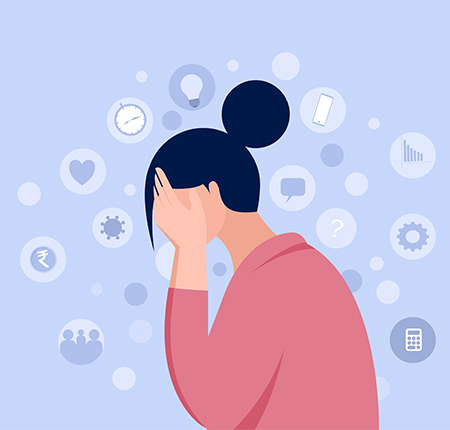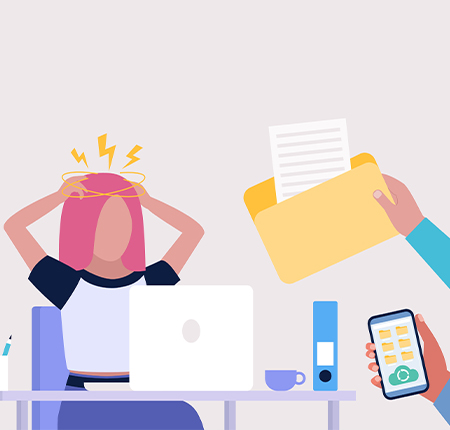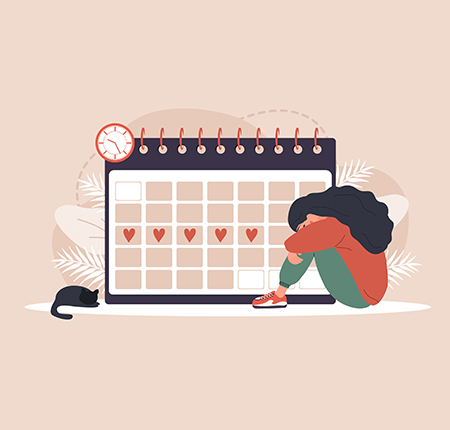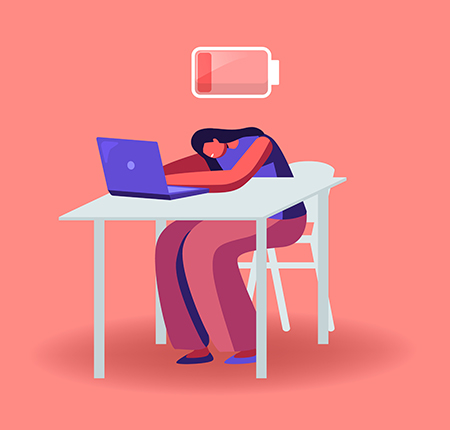
When you have an active social and professional life, tense, stressful situations are inevitable. You face stress at work, traffic in the city, family or financial problems stress you out. In fact, you have been introduced to stress since childhood, even at school: do you remember the stress of tests, exams or listening to the blackboard?
Stress itself does not harm us. On the contrary, it causes us to adapt. In the short term, it can motivate and inspire us to use our capabilities and resources with maximum efficiency to successfully complete a project or activity.
In the long term, on the other hand, it is impossible not to be affected by the state of tension or the emotions that stress entails. This is how productivity drops and stress headaches first appear. That's why we constantly seek a balance between stressful times and relaxing activities. Without managing this stress, we can develop more serious health problems that we will talk about right now.
What is stress and how does it manifest itself?
Let's first see what stress is. By stress we define the natural reaction that our body has to the changes and challenges of everyday life. We cannot say that stress is good or bad, it is simply a coping mechanism.
Our brain perceives challenges and dangers, and responds with increased secretion of cortisol, adrenaline and noradrenaline to help us survive and stay safe. Physical reactions that come with the release of these substances include sweating, increased pulse, blood pressure, and alertness.
All these things are normal. When we are faced with unforeseen or unexpected situations, our body produces a physical and mental response to deal with the stressors. Well, that's exactly what stress is: these normal, human responses to what's happening around us - situations, thoughts, worries, frustrations, etc.

Stress manifests itself, therefore, through a state of tension and tension. And we feel this state both emotionally and physically. In the short term, stress helps us survive. The problem arises when we are long-term exposed to stressful factors, without relaxation breaks. When stress persists in the body for long periods of time, other symptoms begin to manifest.
Stress - Symptoms:
When we are stressed constantly and for long periods of time, without stress-relieving activities, the body uses all its resources to keep us in a state of alertness, slowing down other functions.
We are tense, our breathing is faster and our pulse is higher, insomnia and muscle tension keep us tense, and the activity of the digestive and immune systems slows down. Such situations have a major impact on our overall health, and that is why the symptoms of stress appear on all levels: physical, mental and emotional.
- Headaches;
- Chest, muscle or back pain;
- Feeling that your heart is beating fast;
- Difficulty breathing;
- Hyperventilation;
- Dizziness or tremors;
- Insomnia, fatigue, exhaustion;
- Muscle tension;
- Cramps and muscle spasms;
- Jaw clenching;
- The feeling that you have a dry mouth;
- Nervous tics;
- Sweating;
- Hypertension and palpitations;
- Digestive system problems;
- Indigestion, constipation, bloating, diarrhea;
- Sexual problems;
- Decreased immune system.
The symptoms of stress also appear on a mental and emotional level, with states of:
Anger or sadness;
Nervousness and anger;
Anxiety and irritability;
Panic attacks;
Concentration problems;
Lack of self-confidence;
Depression.
Last but not least, the symptoms are also felt on a social level, because stress can also affect our behavior, through the tendency to develop repulsion towards other people or our partner, but also addictions to:
- Alcohol;
- Tobacco;
- Illegal substances;
- Gambling;
- Sex;
- Shopping;
- Food etc.
Stress, Depression and Anxiety - What's the Difference?
Stress, depression and anxiety are related and can occur simultaneously, but they are not the same thing. They all share feelings of sadness, worry and fear, but they are different things. First of all, stress is a natural response of the body, while depression and anxiety are two medical problems that manifest through certain emotional states.
So, so you can clearly see the difference between the three:
Stress: is a state of alertness, tension, tension of the body, and occurs as a normal response to challenges or changes around.
Anxiety: is an accumulation of emotions, worries, fears, fears, and represents the way you respond to stress in some situations. I've talked about anxiety on the Enroush blog HERE , if you want to talk more about this condition.
Depression: is a serious medical problem that consists of prolonged feelings of sadness, irritability, emptiness, lack of hope or interest in any activity, and that occurs as the body's response to stress, but also from a host of other causes.
Causes & factors of stress - What causes stress?
A first step to learning how to get rid of stress is to understand what's causing it.
We call stressors those situations, events or thoughts that cause us stress. And these stressors - or stressors - can be both real and imagined; both external and internal. They can be routine stressors, sudden change, or traumatic stress.

It's equally important to understand one simple thing about stress: it's subjective. Certain situations may be perceived as interesting or challenging for some, neutral for others, but extremely disturbing and stressful for others. Each person is different, which is why the same stressors can have a different impact on each of us.
The factors with the greatest potential to be stressful for people are usually situations that we feel we cannot control and that overwhelm us. These include but are not limited to:
Family problems: deaths, misunderstandings, divorce, violence, quarrels, etc.;
Financial problems: debts, payment deadlines, etc.;
Conflicts: with friends, with family, with colleagues at work, or even internal conflicts;
Fear: of accidents, of being attacked, of problems with neighbors or other people;
Health problems: illnesses or conditions, physical or mental, personal or of family members, friends, relatives;
Professional challenges: excessive job responsibilities and pressure, disappointing working conditions, difficult communication, unexpected changes or too much workload. The latter can lead to burnout, a topic we have already covered on the blog and which we talk about in more detail HERE .
Retirement;
Change: job, home, city, etc.;
Abuse: verbal, physical or emotional;
Personal dissatisfaction: with how we look, with our own decisions, with our own skills;
Important events: marriage, pregnancy, becoming a parent, a long-awaited vacation;
Traumatic experiences: abortion, sexual abuse;
Large-scale problems: wars, attacks, pandemics, natural disasters, pollution;
Social integration problems: discrimination, bullying, hate.
How does stress affect various organs / functions?
Due to the state of tension, both physical and emotional, the body feels stress in many ways. Which means that prolonged exposure to stressors can disrupt our normal functions and health in many ways.
Let's talk about some of the organs and functions most commonly affected by stress.
Irregular menstrual cycle from stress
As we explained above, whether we are talking about mental, physical or emotional stress, it can increase the production of cortisol and endorphins in the body. These secretions can affect the production of hormones in the body, which will implicitly cause hormonal imbalances. It's a topic we've covered before on the blog, so we're waiting for you in our article with everything you need to know about hormonal imbalances .

So it's no wonder that stress and late periods are linked. Because the menstrual cycle is directly dependent on your hormonal balance, stress becomes one of the most important factors that cause menstrual irregularities. It is not uncommon for periods to change in flow, duration and symptoms during stressful periods, or even be late or not come at all.
Stress and ovarian pain
In fact, we are talking about a vicious circle here. On the one hand, mental or physical stress can cause abdominal contractions without us realizing it. It is a reflex of the pelvic muscles that comes in response to the state of tension in the body. These contractions can lead to a feeling of pressure and weakness in the pelvic area, including ovarian pain.
On the other hand, ovarian pain in turn adds additional stress to the body. So the two problems cause each other, keeping you in a constant state of tension and discomfort.
Stress and chest/heart pain
When the brain sends a rush of adrenaline and cortisol to the rest of the body, a stress response is also triggered almost immediately. The heart beats faster, the pulse increases, and you may sweat and have difficulty breathing. Because of this, stress and anxiety can be causes of chest pain.
You may feel these pains as pressure, pressure or tension. The sensations can be weaker or more intense depending on the intensity of the sensations, and can be accompanied by palpitations and the feeling that you are short of breath or that you are not getting enough air.
There is no need to panic. Although it seems like a pain in the heart, when you feel a chest pain from stress it is not the same as a heart attack. The main difference by which you can tell them apart is the evolution of the pain:
The stress starts with an intense pain in the chest, which gradually improves and almost completely disappears within 10 minutes.
The heart attack begins with a moderate pain that gradually worsens and is accompanied by a sharp pain in one arm, shoulder, or both.
Spots or bruises on the skin from stress
We mean spots that can be skin-colored, pink or red and swollen, often resembling mosquito bites or bumps. Yes, stress can cause these breakouts, with or without itching, which usually go away fairly quickly once you calm down.
When cortisol production increases in the body due to stress, the skin produces more sebum and your body becomes prone to breakouts even if you don't normally experience breakouts.
Liver problems from stress
Another result of chronic stress is the disruption of the normal functioning of the gallbladder. Due to stressful factors, it repeatedly inhibits its bile elimination function. The consequence is an increase in the concentration of cholesterol in the bile, which can lead to the accumulation of gallstones.
In holistic medicine it is argued that long-term suppression of feelings of anger, frustration and anger, as well as resentment and irritability, can cause problems with the liver and gall bladder.
Stress and breast pain
Yes, it is possible to experience breast pain from stress and anxiety without having any other health problems. You can feel these pains in several ways:
- Feeling of heaviness of the breasts;
- Pressing pain;
- Burning sensation;
- Stinging pain;
- Tenderness and pain only to touch;
- Severe pain;
- At the level of both breasts;
- At the level of one breast.
You've probably already noticed that breast pain changes with your menstrual cycle - that's why we call it cyclical. What do you think this means? It means that they are affected by the hormonal changes that the body goes through during a cycle.
As I have said so many times before, stress and anxiety can greatly affect your hormonal balance. Consequence? During stressful times, hormonal fluctuations can cause breast pain even if you are not on or before your period.
Muscle spasms from stress
Sometimes the brain can interpret stress and anxiety as danger, and send these signals to the body. Thus, it releases neurotransmitters from the nerves that control the muscles, which triggers sudden and involuntary muscle contraction. This is how spasms and muscle cramps from stress appear, which can occur at any time, in any muscle group.
Stress-based diabetes
Stress itself does not cause diabetes in the body of a healthy patient. But expert studies have noted that stress and type 2 diabetes may be linked.
With the release of hormones in response to stressors, blood sugar levels can rise. This, in the long term, can cause insulin resistance and increase the risk of diabetes.
Stress dermatitis
Remember how I explained that the red spots or bruises on the skin are due to the sudden stress-based production of cortisol? Stress dermatitis is explained in exactly the same way. Studies show that through its effects on hormone production and the skin's immune system, stress has a strong impact on eczema and skin rashes.
Reducing and managing stress and anxiety through various relaxing activities, stress management strategies and therapies are indispensable to get rid of stress dermatitis.
Stress-based allergy
It's not just cortisol that's produced in higher amounts when you're stressed. It also increases the production of histamine, a substance that strongly influences the body's allergic reactions.
So while stress itself does not cause allergies, it can worsen the symptoms of an already existing allergy by increasing the production of histamine.
Types of stress
It is already obvious that stress is a complex subject with many causes and effects. In this context, we cannot talk about only one kind of stress.
Depending on the duration of the stressful periods, the nature of the stressors and their impact, stress is divided into several types, and we will try to explain each of them to you as best we can.
Acute stress
Acute stress is the most common form of stress that occurs in the short term and is related to an event in the past or near future. For example, when you recently had a heated discussion with someone, or when you are going to give a public presentation shortly.
Due to its nature, acute stress usually passes quickly, and that is why the consequences are not so serious for the human body. It manifests itself in short-term symptoms, including headaches, indigestion and general tension.
However, it is important to relax and try to manage episodes of acute stress as best you can. Because if you experience them repeatedly over long periods of time, it easily turns into chronic stress.
Acute episodic stress
An intermediate stage between acute stress and chronic stress, episodic acute stress occurs when the effects of multiple acute stress situations accumulate. The main characteristic of episodic stress is that you are no longer able to relax and calm down.
Instead of occasionally having those headaches and stressful feelings of acute stress, when you suffer from episodic acute stress you have these feelings constantly. That's why you're always hot-tempered and get angry easily and often.
Chronic stress
Unlike acute stress and episodic stress, chronic stress happens gradually, develops over the long term, and is more dangerous. It usually occurs when you are constantly faced with stressors day in and day out and fail to manage your mental reactions and emotional responses.
Due to chronic stress, it is difficult for the production of stress hormones in the body to return to a normal level, which can cause problems at the level of many functions, organs and systems: sleep, digestive functions, but also the immune, respiratory, cardiovascular and reproductive systems .
Oxidative stress
There is also another type of stress, which we call oxidative, and which often occurs following exposure to radiation, pollution, chemicals, various drugs, but also in people with harmful habits (alcohol or tobacco consumption) or overweight .
The phenomenon of oxidative stress is caused by an imbalance between the production of reactive oxygen in the body and its ability to eliminate it. Studies have found correlations between oxidative stress and a host of neurological conditions, including Alzheimer's, Parkinson's, memory loss, multiple sclerosis and depression.
Post-traumatic stress
There is one more type of stress worth addressing, and that is post-traumatic stress disorder. It's a mental health problem triggered by reliving a traumatic experience you've had or witnessed, even long after that trauma. It can be physical or sexual abuse, an accident, war, or any other significant event.
It can manifest as nightmares or flashbacks and make you relive the upsetting thoughts and feelings of fear, anger, despair, sadness or anger you had during the traumatic event. This type of stress can also make you feel detached or alienated from the people around you.
When should you contact a doctor?
Stress is normal and everywhere in our lives. It's okay to have some periods of heightened stress and lingering tension. But long-term stress can have serious health effects, and it's important to seek professional help. It's a good idea to discuss stress with a doctor if:
You feel overwhelmed;
You face stress over a long period of time;
You have severe pain, rashes or other health problems from stress;
You use alcohol, tobacco, drugs, sex or food as a coping mechanism;
You have destructive thoughts.
How is stress diagnosed?
As I said earlier, stress is subjective, and only you can confirm its presence and assess its intensity. Currently, research is still needed to discover an effective stress diagnostic methodology. So to better understand and diagnose the influence of stress in your life, the doctor can use various questionnaires and biochemical measurements.
He or she may ask you questions about the symptoms your stress is causing, if you have had traumatic experiences in the past, if you have other health problems, or if you are undergoing any treatment. They may also ask about your family history and mental health.
Stress treatment - When do you need it and how can you get rid of stress?
The immediate next question after diagnosis is… how do you get rid of stress? Although it is not quite possible to get rid of it completely - because it still remains an important phenomenon for the survival and adaptation of the body - we can manage our stressors and reactions to them.
Treating stress can be approached in several ways, depending on each person's situation:
- Eliminating stressors: If the cause of stress disappears, so does the stress. Eliminate as many stressors as possible. It may not be possible to change the people who upset you, but you can let go of toxic relationships. It may be impossible for you to change a current deadline, but you can negotiate more reasonable deadlines in the future to eliminate time pressure. Even if you can't eliminate all stressors, you can change the way you approach them to protect yourself from the risk of chronic stress.
- Self-help strategy: through relaxing activities: walks, practicing a sport, meditation or yoga, communicating with close people, listening to music, passive and active rest, etc.;
- Medicines: When stress is caused by a health problem, medicines are used to treat it.
- Therapy: breathing exercises, awareness of the present moment, aromatherapy or reflexology sessions are just a few types of therapy that can reduce stress, anxiety and depression.
In theory, a treatment for nerves and stress is simple. It is more difficult to put into practice, because letting go of the desire to control everything, disconnecting from stressors and relaxation practices do not always come naturally to us. With practice and patience, however, you will be able to improve your symptoms and manage stress better and better.
Anti-stress remedies: pills, teas, healthy habits
In addition to medicinal, therapeutic treatment and relaxation activities, you can also use other anti-stress remedies and drugs. They can help you relax, rest better and reduce the symptoms of everyday stress:
Vitamins for fatigue and stress: You can consume foods rich in vitamin B, C, and D, or food supplements that contain them, to manage stress and fatigue.
Dietary supplements: Melatonin, ashwagandha, and magnesium are also supplements known to support better rest.
Relaxing teas: Chamomile, peppermint, and lavender teas are best known for calming, reducing anxiety, and managing stress.
Changing bad habits: quit smoking, excessive alcohol consumption, exposure to the phone/tablet/laptop/TV screen for 3 hours before sleep, etc.
Adopting a healthy lifestyle: a balanced diet, moderate physical activity and at least 8 hours of sleep per night are essential to be able to cope with stressors.
Taking breaks: Don't skip breaks even if you have a heavy workload. The more stressed and tired you are, the less productive you are. Take breaks from the screen or disconnect from stressors to resume your activity with more energy.
Useful tips for stress management
What better treatment for severe stress can there be than its management? How you manage your stressors can prevent many of the stressful situations you face every day.
So here are some things you can do to prevent unnecessary stress and manage situations that create worry and anxiety during:
- Adolescence: spend time with girlfriends to socialize, but also with yourself to understand your emotions better. Get plenty of rest and try breathing exercises to calm yourself before stressful events like an exam or meeting.
- Work schedule: Preparing your clothes the day before, setting a schedule and morning routine can help you escape the chaos of a chaotic work day, reducing your stress levels. Also, exercise/meal/water breaks and open communication with co-workers can help reduce stress on a busy day at work.
- Pregnancy: A healthy diet, balanced physical activity and rest are essential for an easy pregnancy. You can reduce stress by giving up activities that are not absolutely necessary. Your partner can take over house cleaning, shopping or other stressful activities if they cause you anxiety.
- Menstruation: use products as natural as possible to avoid allergies, irritations and pains that involve additional stress during menstruation. If your period is late, don't panic. There can be various causes, and you can take a pregnancy test to avoid unnecessary stress while waiting for bleeding. And shopping for pads or tampons can create stress and anxiety, but you can manage that with an Enroush subscription , and we make sure you always have organic menstrual products close at hand, worry-free and hassle-free.

- Menopause: In addition to living a healthier lifestyle, positive affirmations can help you manage menopausal stress so you can maintain an optimistic attitude.
Complications - What can you suffer from untreated stress?
Acute and episodic stress have short-term effects, and are not very dangerous. But repeated episodes of acute stress lead to chronic stress. And with chronic stress, the risk of developing cardiovascular disease, type 2 diabetes, autoimmune diseases, depression and other mental or emotional disorders also increases.
So it is very important not to ignore prolonged stress, because it can lead to tragic consequences. Many times, people suffering from chronic stress have a final outburst that ends in heart attack, stroke, suicide or other violent actions.
Stress in pregnancy - How is the fetus affected?
For a harmonious development of the baby during pregnancy, it is recommended to have a lifestyle as healthy as possible, but also a low level of stress. If you are planning or are going to become a mother, or you are simply curious, you can also read what I wrote about the baby's development by trimesters .
Stress during pregnancy increases the risk of premature birth, i.e. before week 37. At the same time, the risk of the baby's birth weight being low (below 2.5 kg) also increases. Both situations carry many risks and health problems for the baby's early life, including hypoglycemia and respiratory distress syndrome.
So managing stress is extremely important both for the progress of the pregnancy and for the health of the child after birth.
Stress in children & adolescents - What can be done?
Throughout the article, I have emphasized the problems and factors that cause stress in adults. But even young people are not exempt from the effects of stress, because the events in their lives can also cause them emotions, intense experiences, upset, fears, shocks and trauma.
We're not just talking about school tests and exams. For children, the desire to live up to parents' expectations and the fear of disappointing can lead to low self-esteem and constant pressure and stress.
For teenagers, relationships with friends and romantic relationships, high school/college acceptance emotions, the desire for validation, the conflicting experiences of puberty, girls' first period, can all be sources of anxiety and even depression.
Signs by which parents can recognize stress in children and adolescents include repeated nightmares or difficulty falling asleep, fear of being alone or, conversely, a lack of desire to spend time with friends and family, changes in appetite and school performance, etc. Every child is different, and parents know their behavior best. Radical behavioral changes can be good indications that the little one is facing or overwhelmed by stressful situations.
As with adults, treatment for childhood stress includes rest, relaxing activities, elimination of stressors, communication and, when necessary, seeing a specialist, therapy or medication.
Frequently Asked Questions
Can stress cause physical pain: in the chest, breasts, bones?
Yes. When the brain perceives stress as a threat, it sends out various signals in the body and even changes the production of certain hormones, so you may feel chest tightness, breast pain, muscle cramps and spasms, or bone pain from stress.
Can tests be done to assess the stress level?
There are no universal stress tests because it is a subjective experience, different for each patient. Your doctor may use various questionnaires, biochemical measurements, and other questions to better understand your symptoms, but only you can assess the level of stress you're feeling.
Can stress cause thyroid disorders?
Yes, too much cortisol that the body releases due to excessive stress can interact with the thyroid gland by increasing the activity and production of more thyroid hormones. Stress can also increase the risk of autoimmune thyroiditis.
How much can stress influence the menstrual cycle?
In the case of short-term stress, menstruation can be delayed or come earlier. Long-term stress, however, can create important hormonal imbalances with a major impact on the menstrual cycle. It can change the duration, flow and symptoms of menstruation, or even cause a long delay or absence of menstruation.
How can you manage stress at work?
Most of the time you can't change your colleagues or standards at work, and you don't want to quit your job either. However, it is essential to manage stress at work to avoid burnout . In this sense, a routine can help you, a well-established program prepared the day before, respecting breaks, organizing tasks and, of course, communicating as efficiently and transparently as possible with the rest of the team.























